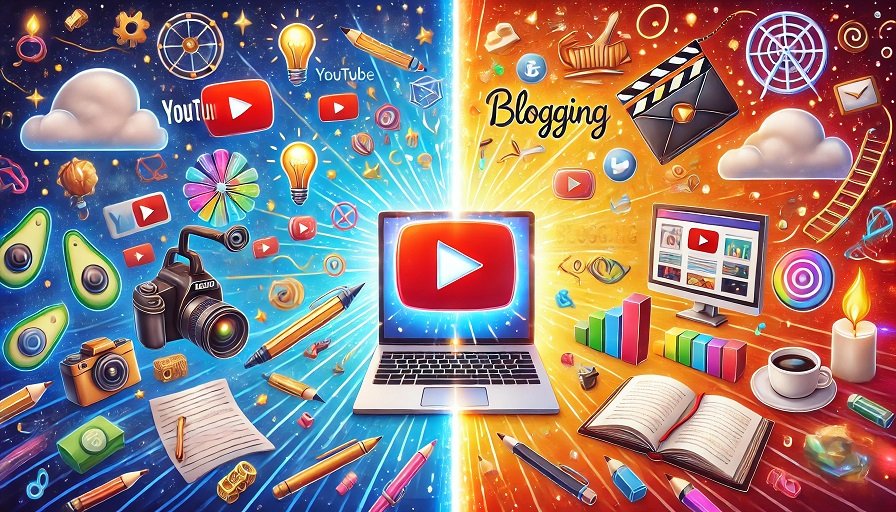In the vibrant world of digital content creation, YouTube content creators and bloggers occupy significant niches, each with unique advantages and challenges. Whether you’re considering diving into video or sticking with text, understanding the landscape is crucial for success. Here’s an in-depth look at the pros and cons of being a YouTube content creator versus a blogger.
YouTube Content Creator
Pros:
- Visual Engagement:
- YouTube is inherently a visual platform, allowing creators to engage audiences with dynamic content like vlogs, tutorials, and entertainment. The ability to convey emotion, instructions, or storytelling through video can be more impactful than text alone.
- Broad Reach and Virality:
- With over 122 million daily users, YouTube offers an expansive audience reach. Videos have the potential for virality, where one video can garner millions of views overnight, catapulting a creator into the limelight.
- Monetization Opportunities:
- YouTube has structured monetization through ads (Google AdSense), channel memberships, merchandise shelves, Super Chat, and sponsorships. Creators can also tap into affiliate marketing or sell their products directly on their channel.
- SEO and Discoverability:
- Videos often rank in search engines, not just on YouTube but also in Google’s search results, providing an additional avenue for discoverability. The platform’s algorithm can help smaller creators gain visibility.
- Community Interaction:
- YouTube fosters a more interactive community with likes, comments, and live chat features. This interaction can build a strong, loyal fan base that feels connected to the creator.
Cons:
- High Initial Investment:
- Starting as a YouTube creator can be more costly. Quality cameras, microphones, and editing software are often necessary to produce content that stands out. The time investment in learning these tools is significant.
- Time-Consuming Content Creation:
- Producing a video, especially one that is polished and engaging, can take several hours or even days from filming to editing, compared to writing a blog post. Once uploaded, videos cannot be edited without re-uploading, which can be cumbersome.
- Platform Dependency:
- YouTube creators are at the mercy of YouTube’s policies, algorithms, and potential demonetization or content removal, which can affect income and visibility. Creators don’t fully own their content on the platform.
- Slower Monetization:
- To monetize, creators need to meet YouTube’s criteria of 1,000 subscribers and 4,000 watch hours in the past year, which can take considerable time to achieve.
- Emotional and Physical Strain:
- Being on camera can be daunting for those not naturally inclined to public speaking. Additionally, the pressure to consistently produce high-quality videos can lead to burnout.
Blogger
Pros:
- Control and Ownership:
- Bloggers have complete control over their content, site design, monetization strategies, and can leverage SEO to drive organic traffic. Hosting your blog means you own your digital real estate.
- Lower Entry Costs:
- Starting a blog is generally less expensive. Basic needs include a domain name and hosting service, with optional costs for premium themes or plugins.
- SEO Advantage:
- Blogs can be optimized for search engines more straightforwardly, with content that lives longer and can be updated to stay relevant, potentially driving traffic over time.
- Flexibility in Content:
- Blogging allows for in-depth exploration of topics through long-form content, lists, guides, and more, without the need for video production skills. It’s easier to revise or update content.
- Passive Income Potential:
- Blogs can generate passive income through ads, affiliate links, sponsored posts, and digital products like eBooks, which can continue to earn money long after they’re published.
Cons:
- Time to Gain Traction:
- Building a readership base for a blog can be slow. It might take months or years of consistent content creation to see significant traffic and revenue.
- Technical Skills Required:
- While not as complex as video editing, blogging requires understanding SEO, web design, and possibly coding for more customization. This learning curve can be steep for those with lesser experience.
- Lower Engagement:
- Blog posts generally offer less immediate engagement compared to videos. There’s less of an instant feedback loop, which might affect community building.
- Content Creation Demand:
- To maintain SEO rankings and reader interest, bloggers must consistently produce high-quality, SEO-optimized content, which can be as demanding as video creation in terms of time and creativity.
- Monetization Challenges:
- While there are various monetization strategies, bloggers often face the challenge of ad saturation and fluctuating ad rates, making income less predictable.
Conclusion
Deciding between becoming a YouTube content creator or a blogger boils down to your personal strengths, interests, and goals. If you’re more comfortable with writing and enjoy a more controlled environment, blogging might be your path. If you thrive in front of the camera and can leverage the visual medium’s power, YouTube could be more rewarding. Both platforms offer incredible opportunities but come with their unique set of challenges. The key is to choose based on where you can excel and enjoy the process, ensuring sustainability and satisfaction in your content creation journey. Remember, many successful content creators often master both mediums, repurposing content to maximize reach and impact.




